 | Rebel Diaz
"Which Side Are You On?" |
|

NEW CCDS Pamphlet
on Climate Change.
|
Blog of the Week...

|

New CCDS Book Reporting on Vietnam
|
|
Radical Jesus:
A Graphic History of Faith 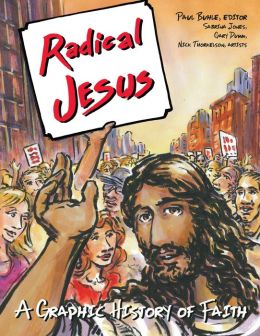 By Paul BuhleHerald Press By Paul BuhleHerald Press
|

Want to Know what CCDS has
been doing...Check it Out!
|
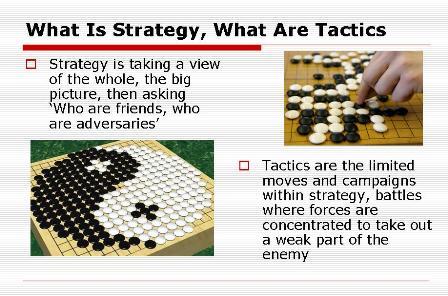 Keep On Keepin' On Keep On Keepin' OnHating the 'Middle Class,' Why Socialists Run in Elections, Strategy and Tactics Slide Slow, Class and Privilege, the Green New Deal ...and other Short Posts on Tumblr by Carl Davidson
|

Edited by Carl Davidson Revolutionary Youth and the New Working Class: The Praxis Papers, the Port Authority Statement, the RYM Documents and other Lost Writings of SDS Changemaker, 273pp, $22.50
For the full contents, click the link and view 'Preview' under the cover graphic.
|
 The new annual edition of our journal of discussion and analysis is now out. More than 170 pages, it includes 14 articles on strategy austerity, organizing, and the right. Cost is $10 plus shipping. Or get one by becoming a sustainer. Click the title to buy it directly. The new annual edition of our journal of discussion and analysis is now out. More than 170 pages, it includes 14 articles on strategy austerity, organizing, and the right. Cost is $10 plus shipping. Or get one by becoming a sustainer. Click the title to buy it directly.
|
|
By Randy Shannon, CCDS

"Everyone has the right to work, to free of employment, to just and favorable conditions of work and to protection against unemployment."
- United Nations Universal Declaration of Human Rights, December 10, 1948
I. Introduction
The "Great Recession" that began in 2007 has caused the greatest percent of job losses since the Great Depression of 1929. This crisis is the end of an era of unrestrained 'neo-liberal' capitalism that became public policy during the Reagan administration. The crisis marks a new level of instability with the growth of a global financial elite that targeted US workers and our trade unions after World War II.
|
|
Order Our
Full Employment Booklets
 |
...In a new and updated 2nd Edition
Capitalism may well collapse under its own excesses, but what would one propose to replace it? Margaret Thatcher's mantra was TINA...There Is No Alternative. David Schweickart's vision of "Economic Democracy" proposes a serious alternative. Even more fundamentally, it opens the door to thinking about alternatives. His may or may not turn out to be the definitive "successor system," but he is a leader in breaking out of the box. |
 by Paul KrehbielAutumn Leaf Press, $25.64
by Paul KrehbielAutumn Leaf Press, $25.64 | | Shades of Justice Video: Bringing Down a President, Ending a War |
|
 By Giuseppe Fiori
Verso, 30 pages
|

Essays on Mondragon, Marx, Gramsci
and the Green and Solidarity Economies |
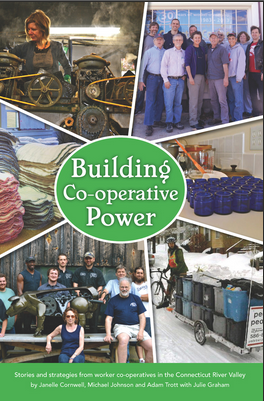
The Story of Workers Coops
in the Connecticut River
Valley Today.
Coauthors: Janelle Cornwell
(Worcester State University),
Michael Johnson (Grassroots
Economic Organizing Newsletter)
and Adam Trott (Valley Alliance
of Worker Co-operatives and
Collective Copies)
|

- Foreword by Susan Brownmiller
- Preface by Ken Wachsberger
$37.50 + $6 shipping
|
|
Discussion Documents for a Militant Movement

By Don Hamerquist
|
|
|
|
An Invitation to CCDSers and Friends...
 Ferguson, Black Ferguson, Black
Power and Wider
Organizing Drives
We're the Committees of Correspondence for Democracy and Socialism...Do you have friends who should see this? Pass it on...Do you have a blog of your own? Others you love to read every day? Well, this is a place where you can share access to them with the rest of your comrades. Just pick your greatest hits for the week and send them to us at carld717@gmail.com!
Most of all, it's urgent that you support low-wage workers, oppose militarized police, the war on Gaza, defend voter rights, plan for 2014 races now, oppose austerity, support the 'Moral Mondays' in North Carolina, the fight for the Green New Deal, a just immigration policy and the Congressional Progressive Caucus' 'Back to Work Budget'! We're doing more than ever, and have big plans. So pay your dues, make a donation and become a sustainer. Do it Now! Check the link at the bottom... |
'Outrageous': Ferguson Organizers Say State of Emergency Violates Laws, Thwarts Civil Liberties

By Nadia Prupis
Common Dreams via Portside
Nov 18, 2014 - In the wake of Governor Jay Nixon's Monday afternoon declaration [1] of a state of emergency in Missouri, activists and civil rights groups are speaking out against a move they say threatens the civil rights of protesters on the ground in Ferguson.
Nixon's announcement, which came ahead of the grand jury's decision in the police shooting death [2] of 18-year-old Michael Brown, is "both premature in its application and presumptuous in [its] intention to the hundreds of peaceful demonstrators who have embraced their Constitutional right to protest," said NAACP president William Brooks.
Anthony Gray, one of the lawyers for Brown's family, told [3] CNN that Nixon was "preparing for war and not necessarily for peace."
"Sometimes you can push people into behaving a certain way just by preparing for just that kind of a reaction," Gray said.
"Governor Nixon's decision to declare a state of emergency without evidence of violence or danger only threatens to stir up tensions and denigrate the peaceful efforts of countless non-violent activists," Brooks said.
Hands Up United organizer Tory Russell noted on Twitter [4] that Nixon does not have the authority to declare a preemptive state of emergency, as Missouri law mandates that a disaster of "major proportions" must have actually taken place before such a declaration can be made. Russell quoted a state General Assembly statute that reads, "The existence of an emergency may be proclaimed by the governor or by resolution of the legislature, if the governor in his proclamation, or the legislature in its resolution, finds that a natural or man-made disaster of major proportions has actually occurred within this state[.]"
Lou Downey, an organizer with Stop Mass Incarceration Network (SMIN), told Common Dreams that Nixon's "state of emergency-mobilizing the National Guard and authorizing violent suppression of protest-is outrageous, illegitimate, and breaking his own laws."
"Nixon offers the public lies about 'protecting free speech' and steps to peaceful change, combined with the reality of unleashing National Guards, rubber bullets and toxic gas on protesters," Downey continued. "Be clear, when Nixon says violence won't be tolerated, he doesn't mean violence by authorities against people." ...(Click title for more)
|
|
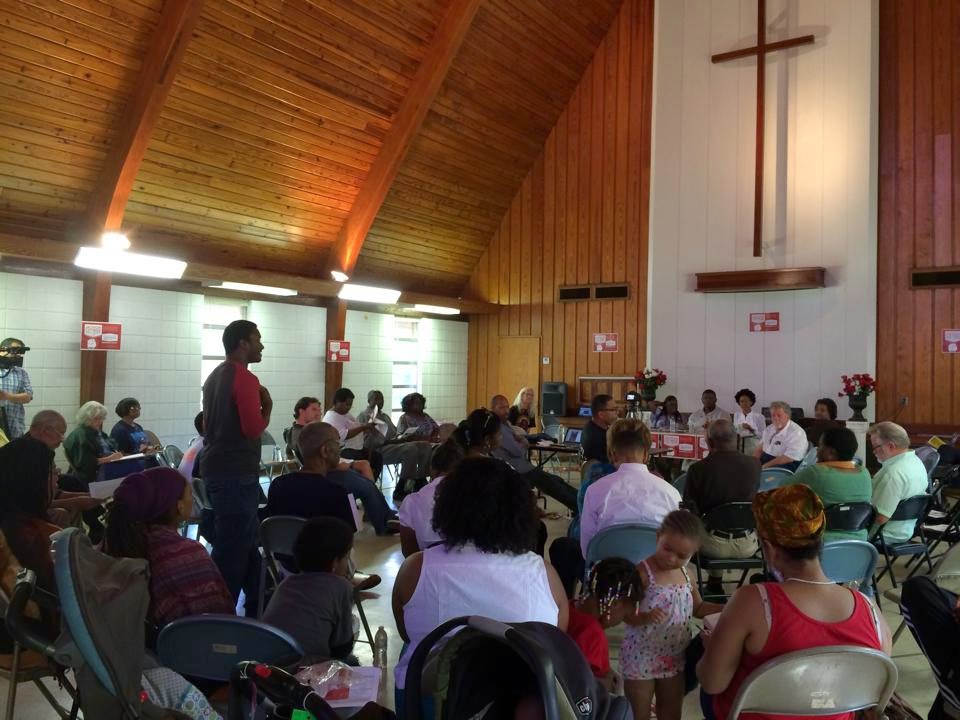
Assembly meeting in Jackson, MS
By Kali Akuno
Navigating the Storm
Written for the New Afrikan People's Organization and the Malcolm X Grassroots Movement
"We must practice revolutionary democracy in every aspect of our Party life. Every responsible member must have the courage of his responsibilities, exacting from others a proper respect for his work and properly respecting the work of others. Hide nothing from the masses of our people. Tell no lies. Expose lies whenever they are told. Mask no difficulties, mistakes, failures. Claim no easy victories...." - Amilcar Cabral
Brief Synopsis
People denied their agency and power and subjected to external authority need vehicles to exercise their self-determination and exert their power. A People's Assembly is a vehicle of democratic social organization that, when properly organized, allows people to exercise their agency, exert their power, and practice democracy - meaning "the rule of the people, for the people, by the people" - in its broadest terms, which entails making direct decisions about the economic, social and cultural operations of a community or society and not just the contractual ("civil") or electoral and legislative (the limited realm of what is generally deemed to be "political") aspects of the social order.
What the People's Assembly Is
A People's Assembly first and foremost is a mass gathering of people organized and assembled to address essential social issues and/or questions pertinent to a community.
"Mass" can be and is defined in numerous ways depending on one's views and position, but per the experience of the New Afrikan People's Organization (NAPO) and the Malcolm X Grassroots Movement (MXGM) in Jackson, Mississippi, we define it as a body that engages at least 1/5th of the total population in a defined geographic area (neighborhood, ward or district, city, state, etc.). We have arrived at this 1/5th formula based on our experience of what it takes to have sufficient numbers, social force, and capacity to effectively implement the decisions made by the assembly and ensure that these actions achieve their desired outcomes.
"Addressing essential social issues", means developing solutions, strategies, action plans, and timelines to change various socio-economic conditions in a desired manner, not just hearing and/or giving voice to the people assembled.
Secondly, another defining characteristic of a truly democratic Assembly is that it calls for and is based upon "one person, one vote". Agency is vested directly in individuals, regardless of if the Assembly makes decisions by some type of voting process or some form of consensus. This aspect of direct engagement, direct democracy, and individual empowerment is what separates a People's Assembly from other types of mass gatherings and formations, such as Alliances or United Fronts, where a multitude of social forces are engaged.
However, given these two basic defining characteristics, it should be noted that there are still different types of People's Assembly's. Within NAPO/MXGM we break Assemblies down into 3 essential types.
- United Front or Alliance based Assembly. This type of Assembly is typically a democratic forum that is populated and driven by formally organized entities (i.e. political parties, unions, church's, civic organizations, etc.) that mobilize their members to participate in broad open decision making sessions with members from other organizations and/or formations. What makes this different then a typical alliance or coalition is that the organizations and their leaders do not make the decisions on behalf of their members in these spaces; members make decisions as individuals within the general body. The main limitation with this type of Assembly formation is that they tend to remain "top heavy". The various organizational leaders often to do not disseminate adequate information about meetings, or inform their members about decisions and activities of the Assembly. And there is the problem is that many organizations do not have consolidated members or a base that they can turn out, instead they are legitimated by their history, social position, or the charisma of their leadership.
- Constituent Assembly. This type of Assembly is a representative body, not a direct democratic body of the people in their totality. This type of Assembly is dependent on mass outreach, but is structured, intentionally or unintentionally, to accommodate the material (having to work, deal with childcare, etc.) and social limitations (interest, access to information, political and ideological differences, etc.) of the people. The challenge with this type of Assembly is that if it doesn't continue to work to bring in new people (particularly youth) and struggle and strive politically to be mass in its character, then it tends to become overly bureaucratic and stagnant over time.
- Mass Assembly. The Mass Assembly is the broadest example of people's democracy. It normally emerges during times of acute crisis, when there are profound ruptures in society. These types of Assemblies are typically all-consuming, short-lived entities. Their greatest weakness is that they typically demand those engaged to give all of their time and energy to the engagement of the crisis, which over time is not sustainable, as people eventually have to tend to their daily needs in order to sustain themselves, their families, and communities. ...(Click title for more)
|

Latest figures shows that today's college graduates are being saddled with the burden of increasingly high student loan debt as they begin careers or start families. But isn't there a better way to finance higher-education? (Hint: The answer is 'Yes.')
By Jon Queally
Common Dreams
Of the nearly 70 percent of U.S. graduates who are forced to take out a loan to pay for colllege, the burden continues to grow by leaps and bounds. When will students rise up? (Graphic: TICAS)
When will students and recent college graduates shake off the burden of increasingly higher student debt and demand a system that serves them instead of making them servants?
The amount of personal debt being accrued by college students in the nation's private and public colleges continues to rise at shocking rates with current graduates of four-year schools exiting with a national average of nearly $30,000 in loans to repay, according to a new report released Thursday.
"To put it bluntly, there is no fiscal reason why the U.S. student debt crisis should exist." -Raúl Carrillo, Modern Money Network
Using available data from private non-profit and public schools in all fifty states for the 2013 academic year, the Project on Student Debt at The Institute for College Access & Success (TICAS) found that the level of debt varies from state to state, but that of the nearly 70 percent of graduates who take out a loan to pay for colllege, the burden continues to grow. According to the report (pdf), the average bachelor-degree graduate-along with a diploma of increasingly questionable value- leaves school with and an average of $28,400 in personal debt. That number is a full 2 percent increase over 2012.
Notably, for-profit colleges-which have been widely criticized for burdening vulnerable students with out-sized private debt-were not included in the TICAS report because those schools nearly universally decline to share their student loan and debt figures with the public.
Among the schools that were covered, however, there was clear variation in the level of student debt depending on the college itself and its geographic location.
At nearly 20 percent of colleges, the report showed, average debt levels for students increased by 10 percent or more over the previous year. As in 2012, about 20 percent of all new graduates' debt was in private loans, which are typically more costly and provide far fewer consumer protections and repayment options than safer federal student loans. The rate of debt also varied between states. "At the state level," the report reads, "borrowers' average debt at graduation ranges from $18,656 to $32,795, with six states topping $30,000 and only one under $20,000. Nearly all the highest debt states are in the Northeast and Midwest, with the lowest debt states in the West and South."
In a separate but related study released on Wednesday, new research and polling that focused on the financial burdens of higher-education among recent college graduates-titled Millennials & College Planning-found that today's students are increasingly "having to let finances dictate their futures."
"One-third of those with student loans are shelling out over $300 per month and five percent are actually paying more than $1000 per month."...(Click title for more)
|
By Elizabeth Warren
Op-Ed, Washington Post
Elizabeth Warren, a Democrat, represents Massachusetts in the Senate.
Nov 7, 2014 - There have been terrible, horrible, no good, very bad Election Days for Democrats before - and Republicans have had a few of those, too. Such days are always followed by plenty of pronouncements about what just changed and what's going to be different going forward.
But for all the talk of change in Washington and in states where one party is taking over from another, one thing has not changed: The stock market and gross domestic product keep going up, while families are getting squeezed hard by an economy that isn't working for them.
The solution to this isn't a basket of quickly passed laws designed to prove Congress can do something - anything. The solution isn't for the president to cut deals - any deals - just to show he can do business. The solution requires an honest recognition of the kind of changes needed if families are going to get a shot at building a secure future.
It's not about big government or small government. It's not the size of government that worries people; rather it's deep-down concern over who government works for. People are ready to work, ready to do their part, ready to fight for their futures and their kids' futures, but they see a government that bows and scrapes for big corporations, big banks, big oil companies and big political donors - and they know this government does not work for them.
The American people want a fighting chance to build better lives for their families. They want a government that will stand up to the big banks when they break the law. A government that helps out students who are getting crushed by debt. A government that will protect and expand Social Security for our seniors and raise the minimum wage.
Americans understand that building a prosperous future isn't free. They want us to invest carefully and prudently, sharply aware that Congress spends the people's money. They want us to make investments that will pay off in their lives, investments in the roads and power grids that make it easier for businesses to create good jobs here in America, investments in medical and scientific research that spur new discoveries and economic growth, and investments in educating our children so they can build a future for themselves and their children.
Before leaders in Congress and the president get caught up in proving they can pass some new laws, everyone should take a skeptical look at whom those new laws will serve. At this very minute, lobbyists and lawyers are lining up by the thousands to push for new laws - laws that will help their rich and powerful clients get richer and more powerful. Hoping to catch a wave of dealmaking, these lobbyists and lawyers - and their well-heeled clients - are looking for the chance to rig the game just a little more. ...(Click title for more)
|
San Diego: The United Taxi Workers Victory and the Struggle for a New Labor Movement

By Jim Miller
San Diego Free Press
Nov. 17, 2014 - Last Monday's victory for the United Taxi Workers of San Diego provided a much-needed boost for local labor. After a year that has included some tough losses at the polls and the effort to save the minimum wage ordinance, it was inspiring to see the taxi drivers (largely East African immigrant workers) burst into celebration and pour out of Golden Hall chanting "USA!" as they embraced each other, mounted the planter boxes, and cheered for joy. It was the kind of genuine expression of collective exuberance that comes when workers feel, perhaps for the first time, that they have taken ownership of their lives and destinies.
Doug Porter ably reported the details last week, but what was most important about that moment was not so much the particulars of the policy but the nature of the movement that led to their triumph. As Richard Barrera, Secretary-Treasurer of the Labor Council, put it in his message to labor folks:
The victory by UTWSD comes five years after drivers, improperly classified as independent contractors and without NLRB recognition, came together and organized a strike to protest their wages, benefits and working conditions. Despite constant harassment, retaliation and intimidation by permit holders and dispatch companies over the last five years, and despite obstruction by public agencies, these workers stuck together, fought back against injustice, and prevailed. It reminds and teaches all of us that a union is not formed by formal government recognition, it is formed by workers standing together to fight for justice and a brighter future for their families.
And UTWSD clarifies for all of us a path to victory for workers even in the age of Harris v. Quinn, ALEC, the Koch Brothers and the anti-worker elements of San Diego (see the Regional Chamber of Commerce, which spoke out against the taxi workers last night). Victory comes from organizers listening to workers, developing leaders, planning a path to win and sticking to the plan no matter how hard it gets. The UTWSD path, although creative and relevant to modern times, is the path that built not only the labor movement, but every movement in the history of our country that has pushed us closer to our American ideals.
And there wasn't a single person in Golden Hall among the hundreds who showed up to support the taxi workers, whether they were from labor or an allied community group, that did not stop, smile, and think: "this is what it's all about."
But if we dig a little deeper into the history of American labor, there is not just inspiration but a lesson as to what kind of unionism and working class politics gets the goods-social justice unionism. ...(Click title for more)
|
By Naomi Klein
ThisChangesEverything.org
Good Timing
Nov. 12, 2014 - Timing isn't everything but it sure helps. After the mid-term elections, the mood in climate circles was getting pretty grim. We faced the prospect of a Republican-dominated House and Senate overturning emission controls, ramming through Keystone XL and elevating a climate denier (James Inhofe) to chair of the Senate Environment and Public Works Committee. Already there was talk that upcoming UN climate negotiations were dead on arrival.
In this context, the US-China climate deal is a badly needed piece of good news. It signals that Barack Obama is willing to expend political capital fighting for his climate legacy.
It Makes It Harder For Republicans to Break Obama's Promises
The deal is also tactically smart: by tying the emission reduction targets of both countries together in a bilateral deal, the President is making sure that his successor will have to weigh any desire to break these commitments against the risks of alienating America most important trading partner. That's smart.
It Robs Climate Obstructionists of Their Best Argument
Most significantly, commitments made by China under the deal take away what has historically been the most effective argument in defense of climate negligence in the US: "Why should we stop polluting if China won't?" For the first time, China is committing to capping its emissions and acknowledging that there must be a limit to its coal-powered growth juggernaut.
It Shows that Movements Matter
The fact that both governments felt the need to make this pledge speaks to the growing power of social movements in China and the US demanding pollutions controls. In the US, 350,000 people marched in NYC in September demanding action. In China, soaring air pollution levels in major cities have put unprecedented pressure on the governing party to stop relying on coal. Particularly in the context of the Hong Kong protests, the Chinese government cannot afford to ignore public opinion.
The Deal Will Galvanize North American Movements Against Tar Sands Pipelines and Coal Export Terminals
Recent years have seen a proliferation of movements blocking the infrastructure needed to export dirty fossil fuels to Asia. This deal makes it clear that the market for such dirty products is winding down in China, which is one more reason for companies not to invest billions in new pipelines or export terminals. Low oil prices are already taking a toll on more expensive extraction methods like tar sands mining and this deal will be another strike against them.
It's Not Enough - But That's What Movements Are For
Both governments are still failing to make climate policy in line with the severity of the crisis, and both are leaving the hardest work for their successors. As I argue in This Changes Everything, we cannot lower emissions in line with science without much deeper economic changes. But pledges matter because movements can harness them to win even more....(Click title for more)
|
Democracy Now! with Amy Goodman and Juan Gonzalez
Nov 13, 2014 - Lt. Gen. Daniel P. Bolger, a retired three-star U.S. general who helped command troops in Iraq and Afghanistan, joins us to discuss his new book, Why We Lost: A General's Inside Account of the Iraq and Afghanistan Wars. Bolger writes: "I am a United States Army general, and I lost the Global War on Terrorism. It's like Alcoholics Anonymous; step one is admitting you have a problem. Well, I have a problem. So do my peers. And thanks to our problem, now all of America has a problem, to wit: two lost campaigns and a war gone awry." Bolger is now calling for a public inquiry along the lines of the 9/11 Commission to look into why the two wars in Iraq and Afghanistan have gone so poorly.
TRANSCRIPT:
JUAN GONZÁLEZ: The United States marked Veterans Day on Tuesday with a series of events nationwide. Speaking at the Vietnam Memorial in Washington, Defense Secretary Chuck Hagel said honoring the nation's troops includes questioning the policies that send them to war.
DEFENSE SECRETARY CHUCK HAGEL: The wall reminds us to be honest in our telling of history. There is nothing to be gained by glossing over the darker portions of a war, the Vietnam War, that bitterly divided America. We must openly acknowledge past mistakes, and we must learn from past mistakes, because that is how we avoid repeating past mistakes. The wall reminds us that we must never take the security of our country for granted, ever. And we must always question our policies that send our citizens to war, because our nation's policies must always be worthy, worthy of the sacrifices we ask of the men and women who defend our country.
JUAN GONZÁLEZ: That was Defense Secretary Chuck Hagel yesterday. Well, we turn now to a retired three-star U.S. general who helped command troops in Iraq and Afghanistan. Lieutenant General Daniel Bolger has just published a book titled Why We Lost: A General's Inside Account of the Iraq and Afghanistan Wars. He writes, quote, "I am a United States Army general, and I lost the Global War on Terrorism. It's like Alcoholics Anonymous; step one is admitting you have a problem. Well, I have a problem. So do my peers. And thanks to our problem, now all of America has a problem, to wit: two lost campaigns and a war gone awry."
AMY GOODMAN: In a piece published this week in The New York Times headlined "The Truth About [the] Wars," General Bolger called for a public inquiry, along the lines of the 9/11 Commission, to look into why the two wars in Iraq and Afghanistan have gone so poorly.
To find out more, we're joined by General Daniel Bolger, served 35 years in the U.S. Army before retiring last year, commanded the Coalition Military Assistance Training Team in Iraq, 2005 to '06; the 1st Cavalry Division in Baghdad, 2009 to '10; and the NATO Training Mission in Afghanistan from 2011 to '13. His military awards include five Bronze [Star] medals, including one for valor, and the Combat Action Badge.
We welcome you to Democracy Now!
LT. GEN. DANIEL BOLGER: Thanks very much, Amy, Juan.
AMY GOODMAN: How did the U.S. lose the wars in Iraq and Afghanistan?
LT. GEN. DANIEL BOLGER: I think that the simplest way to say it is that we misapplied the forces of our armed forces. We didn't use them in the way that they're trained and prepared. You know, Senator, now Secretary, Chuck Hagel, a Vietnam veteran, like his brother, served together in the 9th Infantry Division in Vietnam. His statement there is a very powerful. You've got to have a public debate before you commit American military forces. We did have that after 9/11, but it was very rushed. We had that again in 2002 before going into Iraq. We never continued the debate. The initial phases of both wars went successfully from a military standpoint, but we never followed it up by having a discussion: Is it appropriate to send thousands of young American men and women into foreign countries to go house to house and try to sort out who's a terrorist, who's a villager? That's something we tried in Southeast Asia, and it didn't work. And yet we repeated it once in Afghanistan and then again in Iraq. And that's very disturbing, and I think that led directly to our failure in both campaigns.
AMY GOODMAN: The surge in Iraq?
LT. GEN. DANIEL BOLGER: The surge in Iraq was a-the word is what it means: A surge is a temporary measure. And it was a temporary increase in troops. The best way I would sort of use an analogy is if a patient is ill and has a fever, you can give them a lot of aspirin and bring the temperature down, but when you stop giving the aspirin, the underlying fever is still there. So the surge in Iraq gave some temporary relief-and we did a surge in Afghanistan, as well, in 2009, '10, '11-but it wasn't permanent, and it didn't solve the underlying problem, which is to say that both countries have an insurgency, and the solution to those insurgencies, if there's going to be a solution, rests in the hands of the Iraqis and the Afghans.
JUAN GONZÁLEZ: But the enormous amount not only of casualties that occurred on the U.S. side as well as the Iraqi side in the war, and then this enormous buildup of an Iraqi army trained by the United States that then essentially disintegrated with the rise of ISIS, how did that happen?
LT. GEN. DANIEL BOLGER: Well, we shouldn't be surprised by that. The old Iraqi army-we had fought them twice, in '91 and 2003-they also disintegrated when we came into contact with them. ISIS had a similar experience. It takes many decades to build a decent army. And a few years of training, a couple days at the rifle range, some marching around is not going to do the trick. We've had experience building armies in other countries-I think particularly the South Koreans, who did not do all that well in the Korean War in 1950 to '53, but now have an army capable of defending their country and, in fact, going around the world and doing United Nations missions. South Korean troops served in both Iraq and Afghanistan and served with distinction. But that was an effort of decades. And it does not require hundreds of thousands of troops. It doesn't require fleets of jet bombers. It requires a small number of trainers and a long-term commitment to a solution that the people of that country, the Afghans and the Iraqis, want. ...(Click title for more)
|
November 14, 2014
"The Palestinian struggle for self-determination has become the great international moral issue of our time," the international law expert Richard Falk declares in his latest book, Palestine: The Legitimacy of Hope (Just World Books).
Falk calls it "the last major anticolonial struggle." In this wide-ranging book, the professor emeritus of international law at Princeton University embraces the boycott, divestment and sanctions (BDS) movement, advocates abandoning the two-state solution and argues that the best way of understanding Israel is as a settler-colonial state. He notes that the importance of BDS lies in the fact that it is Palestinian-led and that Israel has "no intention of allowing a viable Palestinian state to be established." He also introduces a new lexicon to avoid the obscurantism that language can often lend itself to. Occupation, he argues, should be called what it is - annexation. Israel's "democracy" is in reality an ethnocracy, human rights "violations" are better described as crimes, home demolitions represent ethnic cleansing and Israeli military doctrine is a form of state terrorism. Falk writes that he is not yet ready to use the word "genocide" to characterize Israel's behavior but "genocidal" is implicit in where its policies seem to be heading. Falk recently completed a six-year stint as the United Nations' special rapporteur on the West Bank and Gaza. A rapporteur, derived from the French, is an investigator assigned to a deliberative body, in this case the UN Human Rights Council, to which Falk reported from March 2008 to March 2014. Nearly all of Palestine: The Legitimacy of Hope is based on articles that Falk wrote while he was special rapporteur. The book is divided into seven chapters, each with an original introduction that provides a framework for what follows. The seven chapters range in topic from peace negotiations to hunger strikes by Palestinian prisoners and the massacres in Gaza to the role of international law and global solidarity movements. Astute
In these writings, Falk demonstrates that he is more than just an expert on international human rights. He is also an astute political observer and a compassionate and compelling moral voice. The central theme of the book is that Palestinians are waging - and winning - a struggle for their legitimate right to self-determination. It is, in effect, a "soft power" struggle of global public opinion and Palestinian resistance, both violent and nonviolent, against the "hard power" of Israeli military superiority backed by the economic, political, military and diplomatic support of the world's lone superpower, the United States....(Click title for more) |
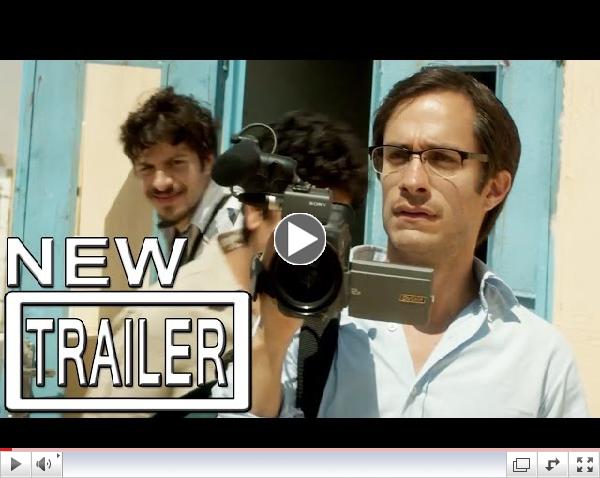 | | Rosewater Trailer Official - Gael Garcia Bernal |
Unmasking Media and Elections in Iran
By Christine N. Ziemba
Paste Magazine
It's no surprise that Rosewater, Jon Stewart's initial foray into feature filmmaking, is a political drama. The Daily Show host is a master of satire, using sardonic wit and intelligent insight to skewer governments, politicians, bureaucrats and the media during his fake news broadcast. But The Daily Show also has a certain loyal demographic that gives Stewart the freedom to test the boundaries of humor and newsiness. Rosewater is his attempt to appeal to a much larger audience, which ultimately results in a well-meaning if diluted film.
The film is based on BBC journalist Maziar Bahari's best-selling memoir Then They Came for Me: A Family's Story of Love, Captivity, and Survival. During Iran's historic 2009 presidential elections, the Tehran-born Bahari (portrayed by Gael García Bernal) left his London home to secure an interview in Iran with Mir-Hossein Mousavi, the primary contender against incumbent Mahmoud Ahmadinejad. After Ahmadinejad declared victory in the race hours before the polls even closed, the broadcast journalist captured footage of street riots and general unrest, which he then transmitted to the BBC.
Because the footage painted the Iranian government in an unfavorable light, the Revolutionary Guard arrested Bahari, a Canadian citizen, and accused him of spying for the West. He was detained for 118 days and subjected to both physical and psychological torture, conducted by a man whom Bahari nicknamed "Rosewater" (played by Kim Bodnia) for his choice of scents.
While many of the film's actors are not Iranian-Bernal is Mexican and Bodnia is Danish-the casting "controversy" is a nonissue. The actors assume their roles expertly and master the mixture of an English-Persian accent used in the film. (It also helps that most Americans are not familiar with Farsi.)
The film adapts Bahari's experiences, its subject treated with the utmost respect. There's no doubt that the wrongly accused journalist is the docudrama's hero, but as he's put on a pedestal, Bahari becomes more archetype and less relatable on a personal level. Stewart and Bahari became friends through the ordeal, and Stewart helped Bahari's wife keep the imprisoned journalist's story alive in the international press. The director has admitted that the film arose from his guilt over The Daily Show's indirect role in Bahari's capture.
Just before the 2009 elections, Daily Show correspondent Jason Jones interviewed Bahari in Iran. With Jones playing himself in the film's most meta scene, he jokingly refers to himself as a spy in the midst of the interview with Bahari. The segment is later shown to Bahari in prison as proof of his own involvement in "espionage." The folly of trying to explain the interview and The Daily Show to his captor leads an exasperated Bahari to exclaim, "Why would a spy have a TV show?"
Humorous moments pepper the film, usually at Rosewater's expense. During the arrest, he questions whether or not Bahari's The Sopranos' DVD is porn and a Leonard Cohen album is "Zionist propaganda." The comedy also helps highlight the absurdity of Bahari's situation and the complexity of Iranian culture. Such levity, as well as touches of magical realism-from Bahari's memories projected onto buildings as he walks along a Tehran street to on-screen hashtags that show the use of social media in political protest-balance the film's darker themes of political and religious persecution. Stewart should have included even more mystical moments and pushed the humor envelope further instead of just dipping his toes in the proverbial pool.
The film's latter half focuses on Bernal and Bodnia's cat-and-mouse exchanges, with Rosewater naturally winning the physical battles by subjecting the blindfolded captive to random beatings. Despite the torment, Bodnia's performance still humanizes Rosewater; he's not simply a sadistic torturer but a conflicted one, too, who must follow orders from his bosses. He's also not the most worldly of men-he's drawn to Bahari's stories and even believes that Fort Lee, NJ is a Persian "massage playground."
During his solitary confinement, Bahari is joined in his small, relatively clean cell by his dead sister Maryam (Golshifteh Farahani) and father Baba Akbar (Haluk Bilginer), who encourages his son to remain "unbroken." Both Baba and Maryam were previously imprisoned and eventually killed by different Iranian regimes for being communists. Their visits are a welcome break-for both Bahari and the audience-as the film loses steam during these imprisonment scenes (which aren't grotesque or graphic). While the conveyance of monotony, and the fear of impending torture, is realized immediately through Bernal's commendable performance, the script lingers here too long, the film languishing in tedium.
As a first-time director, Stewart is assured of the message he wants to present to the masses. He dutifully lays bare the evils of political oppression and human rights violations that often go unnoticed. But in his restraint, Rosewater lacks the punch of other politically minded films.
Director: Jon Stewart
Writer: Screenplay by Jon Stewart,
based on Maziar Bahari's memoir Then They Came for Me
Starring: Gael García Bernal, Kim Bodnia, Haluk Bilginer, Shohreh Aghdashloo, Golshifteh Farahani, Dimitri Leonidas, Claire Foy, Nasser Faris and Miles Jupp
Release Date: Nov. 14, 2014
|
|
Keep up with the Moral Mondays with a Red Resolution...
Become a CCDS member today!
 The time is long past for 'Lone Rangers'. Being a socialist by your self is no fun and doesn't help much. Join CCDS today--$36 regular, $48 household and $18 youth. The time is long past for 'Lone Rangers'. Being a socialist by your self is no fun and doesn't help much. Join CCDS today--$36 regular, $48 household and $18 youth.
Better yet, beome a sustainer at $20 per month, and we'll send you a copy of Jack O'Dell's new book, 'Climbing Jacobs Ladder,' drawing on the lessons of the movement in the South in the 1950s and 1960s.
Solidarity, Carl Davidson, CCDS
|
|
|